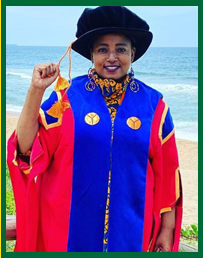Criselda Kananda is an activist, Speaker, Professional Counselor, former Nurse, and medical under- writer. She has worked with differ- ent government departments, as well as the corporate sector on implementing workplace wellness programs nationally and internationally. She was recently conferred an Honorary Doctorate by the faculty of Communication Science with Philosophy in Social Work by the University of Zululand.
1. What inspired your activism and participation in the MDM?
My mom shared a tragic story about being young and pregnant; when her waters broke she walked into Boksburg Hospital, Benoni, which was a whites-only hospital at the time, and was therefore chased away because it was a hospital only meant for whites. A young nurse spotted my mom and helped her give birth in a room filled with soiled linen and helped her get to the closest blacks the only clinic where mom and baby were further assessed. Recognizing the kind gesture, my mother wanted to honor the nurse by naming me after her and that’s where the name ‘Criselda’ came from. My mother’s experience demonstrated that no matter how evil apartheid was, there were good human beings who didn’t subscribe to the evil of ill-treatment of fellow humans because of their race.
Growing in a broken family structure also exposed me to how Migrant Labour created dysfunctional families. The education system was a complete mess. I was born Xhosa, raised by Basotho, and went through my schooling in Zulu and Afrikaans. Somehow these unfortunate experiences amongst many demonstrated that something was wrong; I just didn’t have the understanding.
My grandfather who was a principal in Sebokeng would host meetings in his class pretending to be teaching. I was barred from the meetings and told that girls are not suitable for umzabalazo. In defiance, I would attend meetings and get a good lashing upon return. This humble history increased my curiosity and my intentions were to fight the system without belonging to a specific group but strongly aligned to the African National Congress. I have since been a member for many years serving because of all these combined experiences.
2. What are some of the lessons and values you have learnt as a young activist that remain useful to you, to this day?
That there’s goodness in all of us. My childhood May have been traumatic but it took a young, white woman to save my life. I learnt that indeed it takes a village to raise a child. There may be those who drive a racist agenda but Mama Winnie became my Idol. I was fascinated by how she appeared superior even to the male gender. The level of respect she commanded was quite fascinating to me as a young girl.
Winnie Mandela was to be a true reflection of the woman la expression. As a young girl witnessing this black woman who was fearlessly and passionately opposed to many experiences, I deemed it unacceptable to grow up in townships similar in design, structure, and socialization. I was intrigued by this black woman who stood by her truth; her conviction was captivating. Her influence was vast and contagious. As young girls, we wanted to become Winnie Mandela’s to change the plight of our people and rewrite the script of a black young woman growing up in the township. I wanted to understand the concept of Imbokodo.
Each time she chanted “Wathint’abafazi wathint’imbokodo” that would evoke a level of consciousness within me. I may not have fully comprehended the situation but I deeply felt Mama Winnie’s command. I knew I wanted to become part of something big that would bring about change. Moreover, it was also in defiance of my grandfather who believed that girls must remain soft, pretty, and study in order to become an educated good wife. He would say, “xa ungayi eskoleni uzawuba liqaba lendoda yakho”.
Through Mama Winnie and other woman leaders, I knew that the plight of women and girls needed to change. I knew that I needed to be the change I wanted to see.
1. What has been the most challenging ordeal about your activism?
I believe strongly that the African National Congress has the capacity to change the plight of the majority of this country’s citizens. However, the struggle’s goal post has shifted from collectivism to individualism; this has created leadership with less empathy for the plight of the poor. Taking away from the excellent leadership that the ANC produced over a century which has led to global recognition and respect.
We read about 20 thousand women who marched for a common course, these women stood for something bigger than their own daily challenges. It was for the greater good of humanity. I find today’s politics minimizing the power of women. There’s a disturbing narrative of objectification of Women. Being outspoken, radical, and unapologetic has led me to at times feel misunderstood, celebrated, and intensely disliked all at the same time. Making serving unattractive to more female professionals. This is tragic because the struggle has definitely not ended.
2. What aspects of governance do you wish to see change for the better?
To improve, governance, I believe we need these five basic steps amongst many:
- To increase Diversity in boards serving state-owned entities.
- Appoint Competent Board Members, who are skilled and fit for the cause.
- Ensure Timely Information dissemination on government programs including campaigns that encourage patriotism and active citizenry.
- Prioritize Risk Management and not be reactive to societal
- Evaluate Board and state advisors Performance as opposed to only evaluating political
- Apply punitive consequence management.
This will ensure that we have a clearly crafted and accountable governance in place that is known, understood, and acted upon systematically.
I believe strongly that the African National Congress has the capacity to change the plight of the majority of this country’s citizens. However, the struggle’s goal post has shifted from collectivism to individualism; this has created leadership with less empathy for the plight of the poor.”
I find today’s politics minimizing the power of women. There’s a disturbing narrative of objectification of Women. Being outspoken, radical, and unapologetic has led me to at times feel misunderstood, celebrated, and intensely disliked all at the same time. Making serving unattractive to more female professionals. This is tragic because the struggle has definitely not ended.”

